

European Consensus on Humanitarian Aid. EU Council on Hum.Action Plan. The European Consensus on Humanitarian Aid and the Humanitarian Principles Moving the agenda forward.doc. EU and Humanitarian Consensus. Bridging the Policy & Practice gap. EU Aid Volunteers. The European Commission has just set out its plans to develop a global initiative that will offer some 10 000 people the opportunity to volunteer worldwide within humanitarian operations between 2014 and 2020.
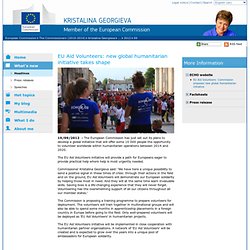
The EU Aid Volunteers initiative will provide a path for Europeans eager to provide practical help where help is most urgently needed. Commissioner Kristalina Georgieva said: ‘We have here a unique possibility to send a positive signal in these times of crisis: through their actions in the field and on the ground, EU Aid Volunteers will demonstrate our European solidarity by helping those most in need.
And they will at the same time learn invaluable skills. Saving lives is a life-changing experience that they will never forget. Volunteering has the overwhelming support of all our citizens throughout all our member states.’ EU plan to deploy 10,000 aid volunteers. Thousands of volunteers could be trained and deployed in humanitarian operations under the European Union banner according to proposals set out today that are partly designed to create a globally trusted EU "brand".
The European Commission has allocated a budget of €240m to the project, which would see some 10,000 people being recruited as 'EU aid volunteers' between 2014 and 2020. In a statement the commission said it hoped the network would "grow over the years into a unique pool of ambassadors for European solidarity". Common European standards for safety and security would be developed and volunteers trained together in multinational groups – serving an apprenticeship in a foreign EU country before being deployed in the field.
The commission said it would work closely with humanitarian groups, adding that only those that adhered to the new European standards would be certified as 'sending organisations'. EU aid volunteers: Kristalina Georgieva. EU Civil Protection legislation. European Commission - Press release Revision of the EU Civil Protection legislation: delivering more effective disaster management Brussels, 20 December 2011 – The European Commission today proposed legislation to strengthen European co-operation in civil protection which will provide a more efficient, effective and rapid response to disasters as well as enhanced prevention and preparedness actions.
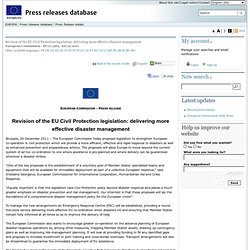
The proposals will allow Europe to move beyond the current system of ad hoc co-ordination to one where assistance is pre-planned and where delivery can be guaranteed wherever a disaster strikes. "One of the key proposals is the establishment of a voluntary pool of Member States' specialised teams and equipment that will be available for immediate deployment as part of a collective European response," said Kristalina Georgieva, European Commissioner for International Cooperation, Humanitarian Aid and Crisis Response. Background For more information Commissioner Georgieva's website: Civil Protection - The future for European civil protection. Treaty of Lisbon The Treaty of Lisbon, once ratified, will introduce several changes regarding civil protection.
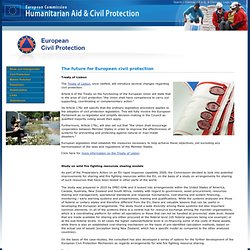
Article 6 of the Treaty on the functioning of the European Union will state that in the area of civil protection “the Union shall have competence to carry out supporting, coordinating or complementary action.” Its Article 176c will specify that the ordinary legislative procedure applies to the adoption of civil protection legislation. This will fully involve the European Parliament as co-legislator and simplify decision-making in the Council as qualified majority voting would then apply. Furthermore, Article 176c, will also set out that “the Union shall encourage cooperation between Member States in order to improve the effectiveness of systems for preventing and protecting against natural or man-made disasters.” Click here for more information on the Treaty of Lisbon Study on wild fire fighting resources sharing models Read more: Read more: EU on Resilience. VOICE: Community Resilience. From Disaster Risk Reduction to Comprehensive Resilience On 23 June 2011, ActionAid UK and VOICE jointly organised a panel discussion on Disaster Risk Reduction (DRR) and how it relates to comprehensive resilience, with the aim of moving towards a common understanding of the increasingly prominent concept of ‘resilience’.
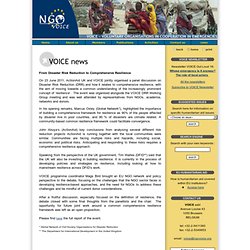
The event was organised alongside the VOICE DRR Working Group meeting and was well attended by representatives from NGOs, academia, networks and donors. In his opening remarks, Marcus Oxley (Global Network*), highlighted the importance of building a comprehensive framework for resilience as 90% of the people affected by disaster live in poor countries, and 90 % of disasters are climate related. A community-based common resilience framework could facilitate convergence. John Abuya’s (ActionAid) key conclusions from analysing several different risk reduction projects ActionAid is running together with the local communities were similar.
VOICE & CONCORD on LRRD. VOICE and CONCORD to the EU: crucial to link humanitarian aid and development to deliver smarter aid Two major European NGO networks, VOICE and CONCORD have launched a joint position paper Linking Relief Rehabilitation and Development (LRRD): Towards a more joined up approach enhancing resilience and impact.
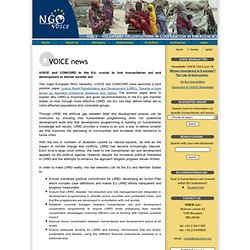
The position paper aims to explain why LRRD is important, and gives recommendations to the EU and member states on how, through more effective LRRD, the EU can help deliver better aid to crisis-affected populations and vulnerable groups Through LRRD the artificial gap between relief and development phases can be overcome by ensuring that humanitarian programming does not undermine development work and that development programming is building on humanitarian knowledge and results.